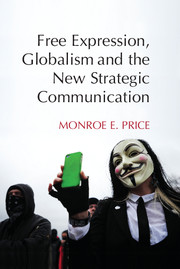Book contents
- Frontmatter
- Contents
- Acknowledgments
- 1 Moving the Needle, Filling the Streets
- 2 Strategic Communication and the Foundations of Free Expression
- 3 Narratives of Legitimacy
- 4 Strategies of the Diagnostic
- 5 Asymmetries and Strategic Communication
- 6 Strategies of System Architecture
- 7 Soft Power, Soft War
- 8 Religions and Strategic Communication
- 9 Regulating NGOs in the Market for Loyalties
- 10 Strategic Platforms
- 11 Strategic Communication and Satellite Channels
- 12 Strategies of Closure, Markers of Anxiety
- Bibliography
- Index
- References
10 - Strategic Platforms
Published online by Cambridge University Press: 18 December 2014
- Frontmatter
- Contents
- Acknowledgments
- 1 Moving the Needle, Filling the Streets
- 2 Strategic Communication and the Foundations of Free Expression
- 3 Narratives of Legitimacy
- 4 Strategies of the Diagnostic
- 5 Asymmetries and Strategic Communication
- 6 Strategies of System Architecture
- 7 Soft Power, Soft War
- 8 Religions and Strategic Communication
- 9 Regulating NGOs in the Market for Loyalties
- 10 Strategic Platforms
- 11 Strategic Communication and Satellite Channels
- 12 Strategies of Closure, Markers of Anxiety
- Bibliography
- Index
- References
Summary
In this chapter, I turn to the 2008 Beijing Olympics to demonstrate how strategic communicators shape opportunities to project their messages and how others then try to wrest control, piggy-back or hijack those opportunities. The Beijing Olympics is a useful case study because it represented a huge investment by China in establishing its story of itself globally. The very idea of China as an international actor – what it is, what role it should play, how it would exercise its power – was and remains a subject over which there is global contestation. Before and during the Olympics, China recognized the potential for a large-scale narrative transformation. The Beijing Summer Games is an example of massive investment to alter attitudes: to reposition China, by changing perceptions both of the domestic population and a global public. How successful this effort was is beyond the scope of this book. In this chapter, I explore a strategic nuance: how the process of projection and counter-projection took place. I consider the Olympics to be an example of a “platform,” a locus (often informal) where contests for attention occur.
Creating and exploiting platforms is often a response to the complexity of modern communications flows. Much of the work in Daniel Dayan and Elihu Katz’s canonical work, Media Events, is about the communications-related aspects of creating and exploiting such platforms. Thinking about these scaffolds for performance is also a way of understanding the complex relationship between infrastructure and freedom of expression discourse. The effectiveness of expression depends, frequently, on access to a platform where the organizer has a substantial capacity to control entry and use and produce access to sympathetic receivers. Platforms may be a way of finding an effective space to consolidate a state’s vision of itself and to crowd out the competition of alternate statements. But global civil society groups and others also have an understandable hunger to exploit such platforms, either to create them or to take advantages of already existing fora to advance their own political and commercial messages.
- Type
- Chapter
- Information
- Free Expression, Globalism, and the New Strategic Communication , pp. 193 - 215Publisher: Cambridge University PressPrint publication year: 2014



